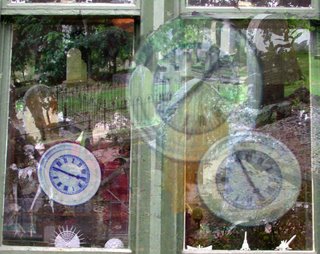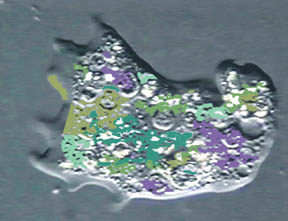Sunday, January 28, 2007
Monday, January 22, 2007
Persistence Redux
The man from the country seeks the Law and is forbidden entrance despite his entreaties. At the end he dies without ever having gained access out of fear of the terrifying guard who stands before the door. What does he fear? (Death?) His door is closed as the light fades from his eyes. A reminder to forcefully pursue one's own path and keep trying!
Sunday, January 07, 2007
Monday, January 01, 2007
Time and Control and More Resolutions
 I've been thinking about time for quite a while now. I live a hectic life and therefore often conceive of time as a relentless, hyper-consistent tyrant cracking its whip above my head as I move to its mechanical rhythms. There are at least a couple of problems with this perspective. The first is the issue of control. My initial reaction is that we must assert our own control and not let ourselves be turned into automatons by some external factor that we ourselves have organized into existence. K in The Trial fails to even question the reasons and terms for his arrest and allows himself to be lead around by the nose (and other more nether body parts) never taking the responsibilities for his own existence upon himself. It is (and Kafka recognizes this explicitly) human to fall into the easy acceptance of a life controlled by exterior circumstances (particularly (I realize) for a writer in post fin de siecle Austria, who must experience his aliveness in the night away from the banks and bureaucracy of the highly hierarchical, diurnal and spiritually dead business-world of Prague.
I've been thinking about time for quite a while now. I live a hectic life and therefore often conceive of time as a relentless, hyper-consistent tyrant cracking its whip above my head as I move to its mechanical rhythms. There are at least a couple of problems with this perspective. The first is the issue of control. My initial reaction is that we must assert our own control and not let ourselves be turned into automatons by some external factor that we ourselves have organized into existence. K in The Trial fails to even question the reasons and terms for his arrest and allows himself to be lead around by the nose (and other more nether body parts) never taking the responsibilities for his own existence upon himself. It is (and Kafka recognizes this explicitly) human to fall into the easy acceptance of a life controlled by exterior circumstances (particularly (I realize) for a writer in post fin de siecle Austria, who must experience his aliveness in the night away from the banks and bureaucracy of the highly hierarchical, diurnal and spiritually dead business-world of Prague.But it is a second and perhaps less Kafkaesque quality of this construct that interests me today. This very concept of time as mechanical clock, I have decided, is an inappropriate precept. A result of the enlightenment concept of physics, this clock model of time assumes regularity and consistency which is not in accord with human experience. People inately sense that time is plastic, malleable and idiosyncratic. As humans we know that things we love doing can span large units of clock time and small segments of experienced time. Likewise tedious paperwork tasks can drag on experientially and make a simple 8 (or 9) hour work day extend a not so virtual eternity. This experience has its proof in nature which also has inconsistent clock days (No matter what the nuclear clock people tell us.) Lengths of days and nights change with the seasons and the latitudes and they do not add up into nicely divided years and centuries. It takes leap years, periodic (haha) clock readjustments and number-obsessed enlightenment-influenced scientists to enforce such a system.
I recently heard a physicist talking about the mapping of space. She did not mean organizing the locations of stars and planets, but rather understanding its shape. We now know that space is not the consistent and infinite entity (that we have somehow modelled on our concept of the Deity) but that it is full of wrinkles and black holes and nonvisible bumps and hiccups. If this is true of our third dimension, then I believe there is reason to suspect that this will be the case with the fourth dimension too. Maybe time, the fourth dimension, has no real relation to time, the 18th century concept. Maybe they are two different entities with the same name, but I have no doubt that the time I live in is bumpy and slippery, arhyhtmic, and full of holes. I have decided that time is like a giant amoeba, that despite its visible boundary has no physically graspable edge. It ebbs and flows and contains detritus and elements that obstruct and ones that slide us forward on slippery protoplasmic currents. We can try really hard to pretend that it fits our rigid equi-segmented model or so to speak, we can go with the flow.

I'm not sure where this leaves the question of control. On the one hand, the concept of irregular time renders the idea of deadlines meaningless, but on the other, if one lives in that world of deadlines, the pressures of obedience and adherence multiply exponentially. Kafka had no choice but to live in the world of deadlines and the act of rebellion (which K fails to engage in in The Trial) would have produced in all likelihood absolutely no improvement in his own life. Perhaps that is the ultimate paradox of life as shown in The Trial. We have a moral responsibility to resist the proclamation of our guilt, but as human beings we are already imperfect and lacking in cosmic innocence. While the road to perfection may well be the one that seeks to understand and control, the means may not exist for imperfect beings to comprehend the true complexities. So what does one do? Go with the flow and end up in a ditch like K because that is where water naturally flows to? My sense is that Kafka wants us to fight, to seek truth even if it seems to be the same barren subject created and recreated in Titorelli's paintings.
My own guts (something that animals think with according to Kafka and therefore inferior to human means of making a determination) tells me that adhering to strictly to the mechanical time standards of our day is harmful and while Kafka's world of the Law (and Torah inspired vision of the cosmos) is a very masculine hierarchical structuration, he also recognizes that the chaotic, sexual merges on the other side. Perhaps Kafka was in a tiny way already atuned to the coming postmodern view of truth (even though his artist figure is not). The high court officials love their sex and pornography and in the "real world" the sources of higher life are still at once mesy and entropic. This viewpoint leads me to an attempt to navigate place (and in this sense I mean moving on rather than stagnating). I resolve to be less concerned about the way time passes, to seek out aesthetic solutions and be strong in questioning the way things are and what happens without falling into stagnant paternalistic judgmentalism. Time will flow the way that it does and I will use it to my best abilities, but also let go of the desire to stuff it into a mold of rhythmic consistency thereby forcing myself into that same restricted environment. Time will be as it is and I will be as I am, searching to continue on and not get bogged down in the mini-(many?)tribulations and trials of daily life. Kafka answered this question with humor. Let me be able to do so too!!
Web Site Counters



